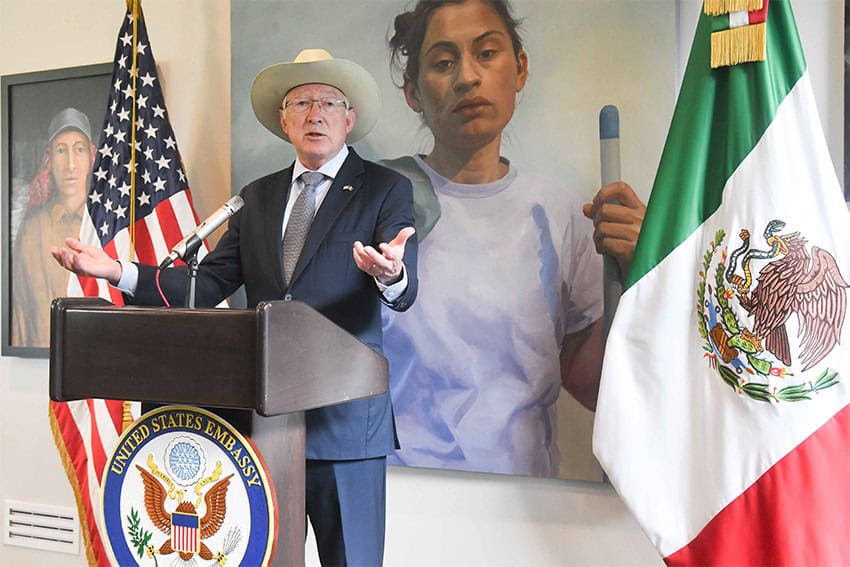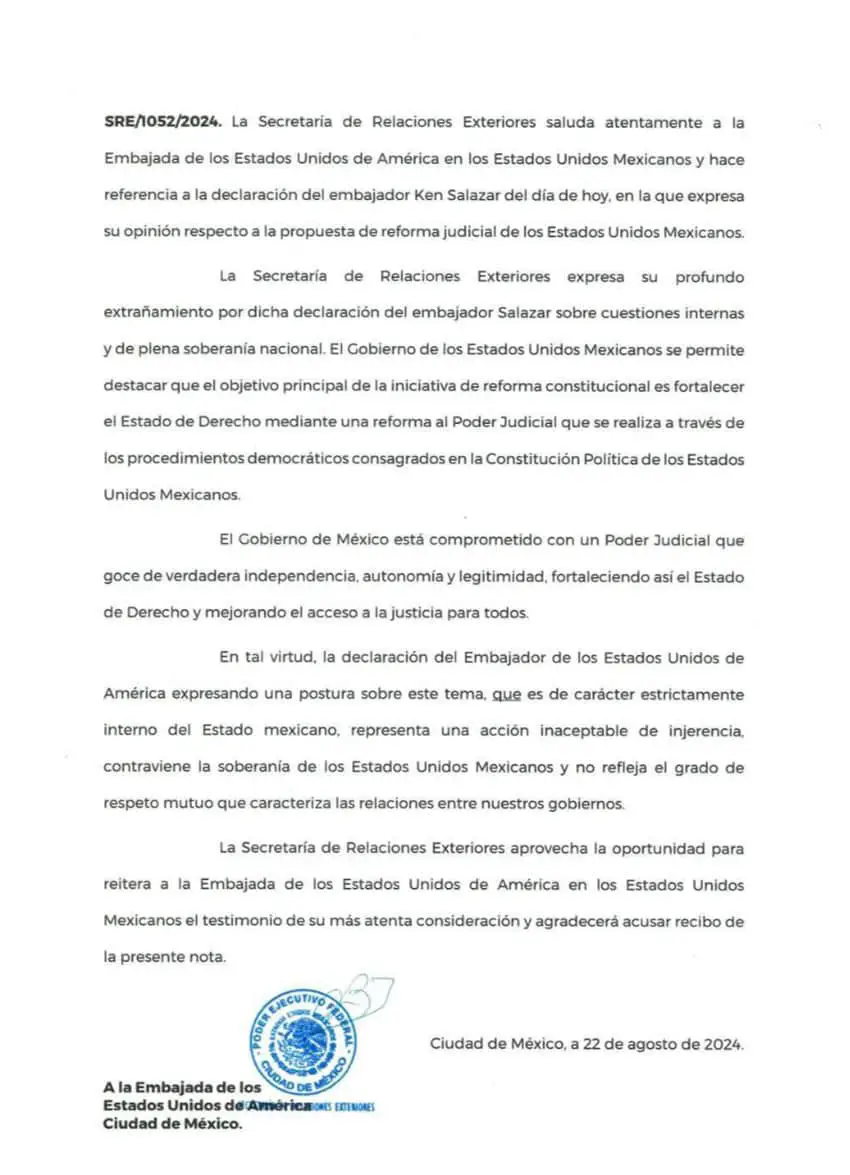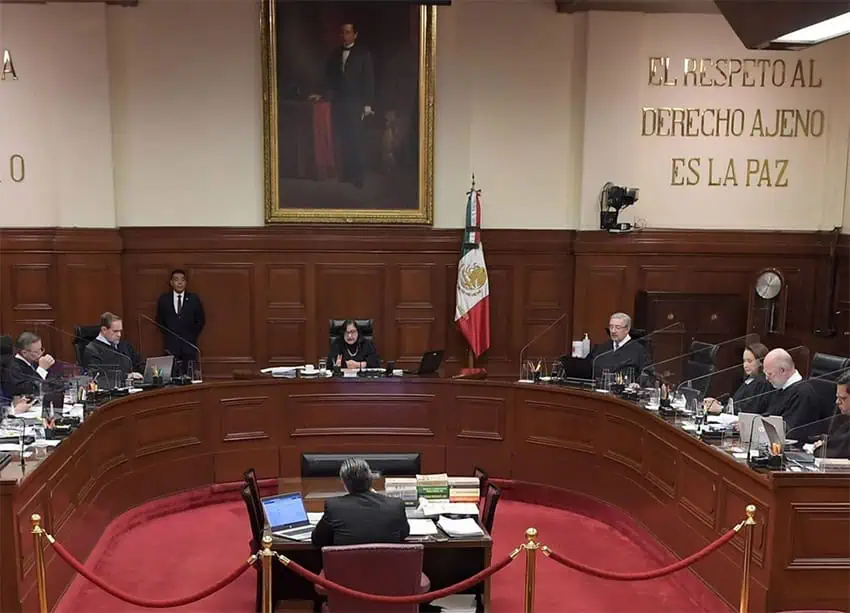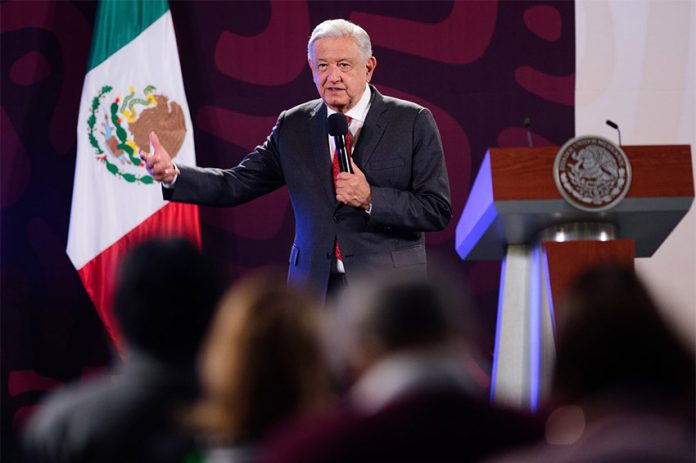President Andrés Manuel López Obrador rebuked United States Ambassador to Mexico Ken Salazar on Friday, asserting that the diplomat’s statement on the federal government’s judicial reform proposal was “unfortunate, imprudent” and demonstrated a “lack of respect.”
At his morning press conference, López Obrador also read out a “note of protest” sent to the United States Embassy in Mexico over what the government called Salazar’s “meddlesome declaration.”
In a statement on Thursday, the ambassador declared that the proposed judicial reform — which seeks to allow citizens to directly elect judges — poses a threat to democracy in Mexico and the U.S.-Mexico trade relationship. He also said it would benefit drug cartels.
“I believe popular direct election of judges is a major risk to the functioning of Mexico’s democracy,” Salazar said.
“… I also think the debate over the direct election of judges … as well as the fierce politics if the elections for judges in 2025 and 2027 were to be approved, will threaten the historic trade relationship we have built, which relies on investors’ confidence in Mexico’s legal framework,” he added.
“Direct elections would also make it easier for cartels and other bad actors to take advantage of politically motivated and inexperienced judges,” Salazar said.

Asked about the statement, López Obrador told reporters that the federal government doesn’t accept “interference” in Mexico’s internal affairs.
“We don’t accept any representative of foreign governments intervening in matters that are solely up to us to resolve,” he said.
In the “note of protest,” or diplomatic note, the Ministry of Foreign Affairs (SRE) expressed its “profound disapproval” over Salazar’s remarks about “internal matters,” and declared that his statement is “an unacceptable act of interference” and a violation of Mexican sovereignty.
“It doesn’t reflect the degree of respect that characterizes relations between our governments,” the SRE added.
López Obrador said that the government would also send a diplomatic note to the government of Canada after Ambassador Graeme Clarke said in an an interview that Canadian investors are concerned about the judicial reform proposal.
AMLO noted that he, as president, has the authority to send reform proposals to Congress, and that the legislature has the power to approve them.
He sent the judicial reform proposal to Congress in February, and the ruling Morena party submitted a modified version of the bill to a lower house committee last Friday. It could be approved as soon as next month, when Morena and its allies will have a supermajority in the lower house of Congress and a strong majority in the Senate.

Opponents of the bill say that the direct election of judges from candidates nominated by the sitting president, the Congress and the judiciary itself threatens the independence of Mexico’s justice system. Judicial elections, in some cases, would coincide with political elections, a situation that critics believe could lead to politicization of the judiciary.
The SRE’s diplomatic note sought to dispel concerns about the reform proposal, affirming that “the government of Mexico is committed to a judicial power that enjoys true independence, autonomy and legitimacy” and can thus strengthen the rule of law and improve access to justice for everyone.
López Obrador explained the government’s motivation for overhauling the judiciary.
“Why are we proposing this reform? Because the judicial power is plagued by corruption. It’s full of corruption; it’s hijacked … and at the service of a greedy minority, those who previously felt they were the owners of Mexico,” he said.
“And never in recent times, in modern history, has the judicial power delivered justice for Mexicans. Rather it has become an instrument at the service of a minority,” said López Obrador, who has been irked by court decisions against his government’s policies and infrastructure projects.
On Friday afternoon, Salazar sought to reframe his remarks on the judicial reform.
On X, he said that “the concerns” he expressed about the direct election of judges were made in the “spirit of collaboration.”
“As partners we seek honest and open dialogue to continue with the great democratic and economic progress we have achieved,” Salazar wrote.
The United States and Mexico have “created an unprecedented relationship as partners and equals,” he said, adding that “communication is crucial” especially when “our common goals and our trade relation” are at stake.

The ambassador also said he is willing to speak with “the leadership of Mexico about the direct election of judges and exchange opinions about different models.”
Sheinbaum: The US elects judges by popular vote
Around seven hours after Salazar issued his statement on Thursday, President-elect Sheinbaum took to social media to provide what she described as “very relevant information.”
“In 43 of the 50 states of the United States of America judges are elected by popular vote,” she wrote.
According to nonprofit organization Equal Justice Initiative, five U.S. states select all of their judges through partisan elections, and 39 states use elections to choose at least some of their judges.
In June, Dr. Michael Kang, a professor at Northwestern University Pritzker School of Law, said that “judicial elections are very, very common in the United States” and noted “that’s kind of unusual internationally speaking.”
Mexico doesn’t currently hold judicial elections, with many judges appointed by the Federal Judiciary Council.
Speaking at a U.S. Department of State event, Kang highlighted that “judicial elections occur at the state level” in the United States, while “at the federal level, the judges, the justices of the Supreme Court, are selected by the president.”
“They’re appointed by the president, and they are approved by the Senate, with the advice and consent of the Senate. … It’s not an election system,” he said.
Información muy relevante: en 43 de los 50 estados de los Estados Unidos de América se eligen los jueces por voto popular.
— Dra. Claudia Sheinbaum (@Claudiashein) August 23, 2024
Under the Mexican government’s proposal, citizens would elect federal judges, including Supreme Court justices.
If the reform is approved, all 11 Supreme Court justices — who are appointed for 15 years — could be replaced in elections in 2025. López Obrador has been critical of Chief Justice Norma Piña and other justices who have handed down rulings against the government.
Sheinbaum told a press conference on Thursday that the judicial reform proposal includes “rules” to prevent the president of the day from directly appointing a judge or interfering in judicial elections.
She also said that the process to select candidates would be “very transparent” and that prospective judges would have the required experience to do the job.
Under the proposal, Sheinbaum asserted, the sitting president will have less of a say in the appointment of Supreme Court justices, not more, as critics of the bill argue.
“The president will no longer have a hand in appointing justices,” she said.
“… It’s a very complete process,” Sheinbaum said, referring to both candidate selection and judicial elections.
“It’s new, but it has nothing to do with this idea … that [judges] are now going to be more aligned to the president. … It’s a complete proposal that guarantees autonomy [for the judiciary],” she said.
With reports from Proceso
